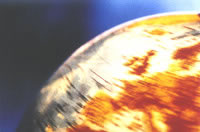In 2004 the European Union is expected to spend 99.7bn euros, or 0.98% of its members' gross national income (including those joining on 1 May).
It is committing another 11bn euros or so to programmes that are starting but will not finish in 2004. So the total level of commitments comes out at 111.3bn euros.
Of this, 11.8bn euros (10%) is devoted to spending programmes in the 10 new member states.
AGRICULTURE / RURAL AID
Agricultural subsidies and rural development projects swallow 42% of the 2004 budget.
France has traditionally been far and away the biggest recipients of these funds.
Farmers from the new member states will begin by receiving subsidies at only 25% of the rate they are paid to farmers in the other 15 EU countries, but this will slowly increase. Equality will be attained by 2013.
As a rule, agriculture plays a bigger role in the economies of the new member states than it does in the more developed economies of the older member states. They will in time become major recipients of agricultural and rural aid.
However, the EU is under pressure to reduce agricultural subsidies in order to give developing countries a better chance to export food to Europe.
REGIONAL AID
Regional aid is the second biggest item in the EU budget, accounting for 37% of the total in 2004.
Most of it is used to boost the economies of poor, distant or under-populated parts of the European Union.
Spain is by far the biggest recipient of these funds (for 2002).
It is keen to continue receiving them even after the accession of poorer countries from Central Europe.
The EU is committing 6.7bn euros in regional aid to the 10 new member states in 2004 (16% of the total for the 25 states) but only a third of this will be paid out by the end of the year.
About half of the total spent in the new member states will be used for transport infrastructure and environmental projects.
FOREIGN AID
A large slice of the EU's foreign aid goes to future EU members. In 2004, recipients include Bulgaria and Romania (780m euros), Turkey (250m euros) and the new member states joining the EU on 1 May.
The EU is now the world's largest aid donor. Nearly 1bn euros is available to spend on food aid and humanitarian aid to countries suffering disasters in 2004. Some 160m euros will be devoted to reconstruction in Iraq.
A total of 2.7bn euros will fund co-operation programmes with countries in the Mediterranean region and the Middle East, southern Africa, the Western Balkans and developing countries in Asia and Latin America.
There is a funding strategy for each region. For example, in the case of the Western Balkans the emphasis is on improving governance and fighting organised crime.
The Common Foreign and Security Policy budget will fund, among other things, two police missions in Bosnia and Hercegovina and in FYROM.
ADMINISTRATION
The administration budget of 6bn euros covers salaries, pensions, buildings and equipment.
This is roughly equivalent to the budget of the mayor of Paris.
The European Commission itself accounts for roughly half of the total, three billion euros - about 1bn euros less than the budget of the mayor of London.
The EU institutions employ about 33,000 officials.
Of these, about 22,000 work for the Commission.
Commission staff is guaranteed a job for life, with numerous perks such as allowances for living abroad, children's education and travel home.
RESEARCH
The EU's spending on research and technical innovation dates back to the mid-1980s, when the US and Japan were seen recovering quickly from the post-1979 recession.
This was attributed partly to their adoption of new technology.
A simultaneous net outflow of investment funds from western Europe to the US raised fears that the EU could be left with an obsolete industrial base.
EU research funding gives priority to projects that bring together research centres, companies and universities from different member states.
OTHER SPENDING
This includes 1.4bn euros in compensation to new member states that would otherwise have been net creditors to the EU in their first year.
Nearly 0.8bn euros will be spent in 2004 on trans-European transport, energy and telecom networks, with the goal of improving competitiveness and boosting employment.
Another 0.7bn euros is devoted to education, vocational training and youth - some of it to pay for students to study in another EU state.
Two new budget strands are 317m euros to help new members strengthen the EU's outer border, and 138m euros to help Lithuania and Slovakia close nuclear power plants.




 By: N. Peter Kramer
By: N. Peter Kramer
